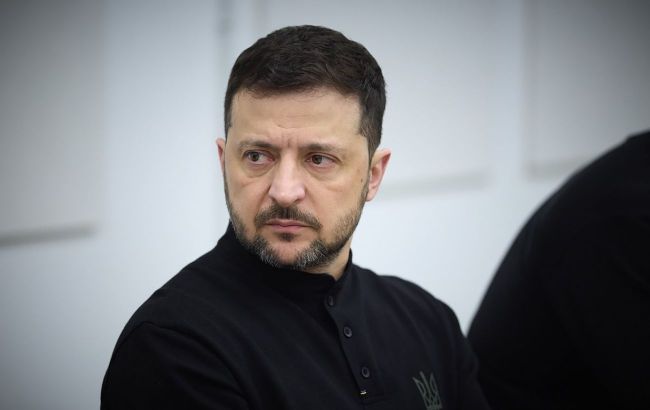Missiles over diplomacy: What Ukraine-Russia talks revealed this week
 Photo: President Volodymyr Zelenskyy (Getty Images)
Photo: President Volodymyr Zelenskyy (Getty Images)
As before, negotiations on the Russian-Ukrainian conflict remain at a stalemate. However, discussions about new US military aid to Ukraine have intensified.
RBC-Ukraine explains the key meetings and statements, as well as their impact on the course of the war.
Key questions:
-
Why have the negotiations stalled?
-
What new American weapons could Ukraine receive?
-
How is Russia responding?
Not negotiations, but weapons
US Vice President JD Vance said on September 28 that the Trump administration still "strives for peace," adding that achieving it requires "steps from both sides." However, the Russian Federation has refused to engage in talks.
"Unfortunately, what we've seen over the last couple of weeks is that the Russians have refused to sit down with any bilateral meetings with the Ukrainians. They've refused to sit down with any trilateral meetings where the president or some other member of the administration (Trump -ed.) could sit down with the Russians and the Ukrainians," Vance told Fox News.
Still, there has been no progress on imposing new US sanctions directly against Russia. According to Bloomberg, the G7 (which includes the United States) is working on several new restriction options. These measures target key sectors of the Russian economy, including energy, finance, and the defense industry. The sanctions will also target countries and organizations that assist Moscow in its war or help it circumvent existing sanctions.
At the same time, discussions about supplying Ukraine with US Tomahawk cruise missiles have intensified this week. Trump’s special representative, Keith Kellogg, confirmed this early in the week. However, he later clarified that he was referring only to public statements and had no internal information about the process or any final decision.
In addition, sources cited by The Wall Street Journal report that the United States will provide Ukraine with intelligence data for strikes on Russia’s energy infrastructure.
Commenting on this prospect, Ukrainian President Volodymyr Zelenskyy confirmed that he is awaiting the corresponding decision from Trump.
"We spoke with the United States. We are very thankful to President Trump for this dialogue. Last time, we had a very good meeting, very productive dialogue," said Zelenskyy.
According to him, during the discussion, the sides talked about supplying long-range weapon systems.
"We will see. Everything depends on his decision. This is significant," the president added.
Kremlin spokesman Dmitry Peskov reacted cautiously to these statements from the United States. He said it was necessary to understand the potential threats and determine who would be involved in the launch process.
"The question remains as follows: who can launch these missiles? Can only Ukrainians do it, or must it be American military personnel? Who assigns the targeting — the American side or the Ukrainians themselves?" Peskov said.
He also stated that even if Ukraine received the missiles, they would not be a "miracle weapon" and would not "change the dynamics" of the war.
Meanwhile, negotiations are ongoing for Ukraine to transfer its technologies to the United States. A Ukrainian delegation composed of representatives from the NSDC and the Ministry of Defense has visited Washington for this purpose.
"The main goal of the Ukrainian team’s visit is technical negotiations to prepare for signing an agreement on the purchase of Ukrainian drones. Its implementation also involves the possibility of creating joint Ukrainian-American production facilities," said NSDC Secretary Rustem Umerov.
Escalation of rhetoric
According to Polish Foreign Minister Radosław Sikorski, Trump has taken Ukraine’s side because “he likes winners.” He believes the US president’s position was influenced by the fading of Russia’s offensive on the front and Ukraine’s successful strikes on Russian energy facilities.
"Ukraine has already attacked something like half of the Russian refineries, which means that it's more difficult for the war machine to continue to attack Ukraine. And President Trump famously likes backing a winner," Sikorski told CNN.
Trump himself, speaking before US generals on September 30, recounted one of his conversations with Putin.
"I said to him, 'You know, you don’t look good. You’re four years fighting a war that should have taken a week. Are you a paper tiger?" Trump said.
The term "paper tiger" typically refers to someone who appears formidable but lacks real strength. Trump again expressed disappointment in Putin, saying that, in his opinion, the Kremlin leader should have already ended the war against Ukraine.
In response to this comparison, Russian dictator Vladimir Putin compared Russia to NATO itself, effectively challenging the Western alliance.
"If Russia is a paper tiger, then what is NATO?.. Go ahead and try to deal with the paper tiger," Putin said during his speech at the Valdai Discussion Club.
Putin’s words were soon followed by new massive Russian strikes on Ukraine’s energy infrastructure and drone provocations against European countries. While Kyiv continues to respond actively and inflict serious damage on the Kremlin, Europe’s response has been delayed.
European countries were expected to finalize their response this week at two summits in Copenhagen. Discussions focused on the “Drone Wall” project and providing Ukraine with a reparations loan from frozen Russian assets. However, no consensus was reached on either issue.
Under such circumstances, Kyiv will continue to purchase weapons from the United States and deepen defense cooperation with Central, Eastern, and Northern European countries, for whom the Russian threat remains most tangible.
With Trump showing a clear loss of interest in peace negotiations, this remains one of Ukraine’s most effective potential options for the coming autumn and winter.

